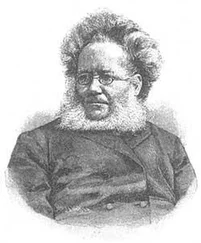Dr. Stockmann. Yes but, Peter, that is what it is.
Peter Stockmann. And all this at this juncture—just as the Baths are beginning to be known. There are other towns in the neighbourhood with qualifications to attract visitors for bathing purposes. Don't you suppose they would immediately strain every nerve to divert the entire stream of strangers to themselves? Unquestionably they would; and then where should we be? We should probably have to abandon the whole thing, which has cost us so much money–and then you would have ruined your native town.
Dr. Stockmann. I—should have ruined—!
Peter Stockmann. It is simply and solely through the Baths that the town has before it any future worth mentioning. You know that just as well as I.
Dr. Stockmann. But what do you think ought to be done, then?
Peter Stockmann. Your report has not convinced me that the condition of the water at the Baths is as bad as you represent it to be.
Dr. Stockmann. I tell you it is even worse!—or at all events it will be in summer, when the warm weather comes.
Peter Stockmann. As I said, I believe you exaggerate the matter considerably. A capable physician ought to know what measures to take—he ought to be capable of preventing injurious influences or of remedying them if they become obviously persistent.
Dr. Stockmann. Well? What more?
Peter Stockmann. The water supply for the Baths is now an established fact, and in consequence must be treated as such. But probably the Committee, at its discretion, will not be disinclined to consider the question of how far it might be possible to introduce certain improvements consistently with a reasonable expenditure.
Dr. Stockmann. And do you suppose that I will have anything to do with such a piece of trickery as that?
Peter Stockmann. Trickery!!
Dr. Stockmann. Yes, it would be a trick—a fraud, a lie, a downright crime towards the public, towards the whole community!
Peter Stockmann. I have not, as I remarked before, been able to convince myself that there is actually any imminent danger.
Dr. Stockmann. You have! It is impossible that you should not be convinced. I know I have represented the facts absolutely truthfully and fairly. And you know it very well, Peter, only you won't acknowledge it. It was owing to your action that both the Baths and the water conduits were built where they are; and that is what you won't acknowledge—that damnable blunder of yours. Pooh!—do you suppose I don't see through you?
Peter Stockmann. And even if that were true? If I perhaps guard my reputation somewhat anxiously, it is in the interests of the town. Without moral authority I am powerless to direct public affairs as seems, to my judgment, to be best for the common good. And on that account—and for various other reasons too—it appears to me to be a matter of importance that your report should not be delivered to the Committee. In the interests of the public, you must withhold it. Then, later on, I will raise the question and we will do our best, privately; but, nothing of this unfortunate affair not a single word of it—must come to the ears of the public.
Dr. Stockmann. I am afraid you will not be able to prevent that now, my dear Peter.
Peter Stockmann. It must and shall be prevented.
Dr. Stockmann. It is no use, I tell you. There are too many people that know about it.
Peter Stockmann. That know about it? Who? Surely you don't mean those fellows on the "People's Messenger"?
Dr. Stockmann. Yes, they know. The liberal–minded independent press is going to see that you do your duty.
Peter Stockmann (after a short pause). You are an extraordinarily independent man, Thomas. Have you given no thought to the consequences this may have for yourself?
Dr. Stockmann. Consequences?—for me?
Peter Stockmann. For you and yours, yes.
Dr. Stockmann. What the deuce do you mean?
Peter Stockmann. I believe I have always behaved in a brotherly way to you—haven't I always been ready to oblige or to help you?
Dr. Stockmann. Yes, you have, and I am grateful to you for it.
Peter Stockmann. There is no need. Indeed, to some extent I was forced to do so—for my own sake. I always hoped that, if I helped to improve your financial position, I should be able to keep some check on you.
Dr. Stockmann. What! Then it was only for your own sake—!
Peter Stockmann. Up to a certain point, yes. It is painful for a man in an official position to have his nearest relative compromising himself time after time.
Dr. Stockmann. And do you consider that I do that?
Peter Stockmann. Yes, unfortunately, you do, without even being aware of it. You have a restless, pugnacious, rebellious disposition. And then there is that disastrous propensity of yours to want to write about every sort of possible and impossible thing. The moment an idea comes into your head, you must needs go and write a newspaper article or a whole pamphlet about it.
Dr. Stockmann. Well, but is it not the duty of a citizen to let the public share in any new ideas he may have?
Peter Stockmann. Oh, the public doesn't require any new ideas. The public is best served by the good, old established ideas it already has.
Dr. Stockmann. And that is your honest opinion?
Peter Stockmann. Yes, and for once I must talk frankly to you. Hitherto I have tried to avoid doing so, because I know how irritable you are; but now I must tell you the truth, Thomas. You have no conception what an amount of harm you do yourself by your impetuosity. You complain of the authorities, you even complain of the government—you are always pulling them to pieces; you insist that you have been neglected and persecuted. But what else can such a cantankerous man as you expect?
Dr. Stockmann. What next! Cantankerous, am I?
Peter Stockmann. Yes, Thomas, you are an extremely cantankerous man to work with—I know that to my cost. You disregard everything that you ought to have consideration for. You seem completely to forget that it is me you have to thank for your appointment here as medical officer to the Baths.
Dr. Stockmann. I was entitled to it as a matter of course!—I and nobody else! I was the first person to see that the town could be made into a flourishing watering–place, and I was the only one who saw it at that time. I had to fight single–handed in support of the idea for many years; and I wrote and wrote—
Peter Stockmann. Undoubtedly. But things were not ripe for the scheme then—though, of course, you could not judge of that in your out–of–the–way corner up north. But as soon as the opportune moment came I—and the others—took the matter into our hands.
Dr. Stockmann. Yes, and made this mess of all my beautiful plan. It is pretty obvious now what clever fellows you were!
Peter Stockmann. To my mind the whole thing only seems to mean that you are seeking another outlet for your combativeness. You want to pick a quarrel with your superiors—an old habit of yours. You cannot put up with any authority over you. You look askance at anyone who occupies a superior official position; you regard him as a personal enemy, and then any stick is good enough to beat him with. But now I have called your attention to the fact that the town's interests are at stake—and, incidentally, my own too. And therefore, I must tell you, Thomas, that you will find me inexorable with regard to what I am about to require you to do.
Dr. Stockmann. And what is that?
Peter Stockmann. As you have been so indiscreet as to speak of this delicate matter to outsiders, despite the fact that you ought to have treated it as entirely official and confidential, it is obviously impossible to hush it up now. All sorts of rumours will get about directly, and everybody who has a grudge against us will take care to embellish these rumours. So it will be necessary for you to refute them publicly.
Читать дальше









